Nonetheless typing full-blown questions into Google prefer it’s 2012? If you need sharper, quicker, and extra focused outcomes, it’s time to get cozy with Google Search Operators.
Superior operators assist you fine-tune your Google search queries, dashing up your analysis and making your job so much simpler.
As a content material marketer, I exploit Google search to seek out correct info and information, monitor rivals, and uncover alternatives for brand spanking new content material.
These little snippets of punctuation and instructions can rework your searches from chaotic guesswork into laser-focused precision. W hether you’re an search engine optimisation, a marketer, a pupil, or simply somebody looking for that one PDF you swear you noticed final week, this up to date listing will assist you grasp Google like a professional.
Listed below are 20 up-to-date Google Search Operators that also work in 2025 and find out how to use them neatly.
What Are Google Search Operators?
Google search operators are particular instructions you could combine into your search queries to realize extra exact and focused outcomes.
They operate by instructing Google’s search algorithms to give attention to particular parts inside internet pages, filtering the outcomes primarily based in your designated standards. These operators provide better management over your search and may considerably improve the effectivity of your analysis course of.
Google search operators are additionally generally referred to as “Google search instructions” or “superior operators.”
Savvy content material entrepreneurs use search operators when researching key phrases, rivals, and weblog put up headlines or when checking search engine optimisation well being.
Superior operators additionally assist you discover dependable info and information on your content material, serving to you enhance your total search engine optimisation technique.
Google Search Operators Cheat Sheet
I’ve put collectively this helpful desk of Google search operators. For every operator, you’ll discover a transient rationalization of what it does, together with a search question instance.
Of those operators, I’ve discovered 9 of them probably the most helpful. I’ve listed these first. You may click on their hyperlinks to leap right down to a extra detailed rationalization and use case.
| Search Operator | What it Does | Instance Question |
| Quotes (“”) | Return solely outcomes with a precise particular phrase | “conversion optimization suggestions” |
| Minus (-) | Exclude a particular key phrase from the search outcomes | conversion optimization -tips |
| website: | Return outcomes from a selected website | website:optinmonster.com lead era |
| Asterisk (*) | Substitute this with something, reminiscent of totally different phrase endings or totally different numbers or phrases | lead generat* |
| inurl: | Return outcomes with a particular phrase or phrase within the URL | inurl:conversion |
| intitle: | Return outcomes with a particular phrase or phrase inside the title | intitle:conversion |
| OR | Return outcomes for one question or the opposite question | conversion OR optimization |
| outline: | Return definitions | outline:lead magnet |
| filetype: |
Return particular filetypes | filetype:PDF electronic mail advertising and marketing |
| allintext: | Return webpages containing all the specified phrases of their physique content material. | allintext: floating bar web site |
| intext: | Return webpages with a particular phrase of their physique content material. | intext: search engine optimisation |
| earlier than: | Return outcomes revealed earlier than a particular date (YYYY-MM-DD) | tech legal guidelines earlier than:2023-01-01 |
| after: | Return outcomes revealed after a particular date (YYYY-MM-DD) | tech legal guidelines after:2023-01-01 |
| climate: | Return climate info for a particular location | climate:Barcelona |
| shares: | Return inventory info for a particular ticker image | shares:GOOG |
| map: | Return map outcomes for a particular location | map:Karachi |
| supply: | Return information articles from a particular supply | supply:BBC tech legal guidelines |
| loc: | Return outcomes close to a particular location | loc:Nashville, TN pizza |
| Parentheses () | Group search phrases to regulate the order that Google evaluates them | “photo voltaic power” (advantages OR set up) |
| cache: | Return a cached model of a webpage as a substitute of the dwell website. | cache:optinmonster.com |
That’s the fowl’s eye view. Now let’s take a deep dive into the primary 9 of those superior Google search operators.
Use Instances for 9 Google Superior Search Operators
1. Quotes (“”)
Wish to slim down your search to return solely outcomes that embody a precise match of a particular phrase? Put that phrase in citation marks.


This search operator is beneficial for eradicating any irrelevant outcomes, significantly with longer search queries.
Use Case: Examine for scraped content material
Let’s say I wish to examine and see if anybody has been stealing my content material. As well as, I additionally wish to make it possible for our website’s content material isn’t getting filtered out of the search outcomes as duplicate content material as a result of somebody scraped our put up.
To do this, I might copy an extended string of textual content from my put up.


Subsequent, I’ll paste it into Google and put quotes round it.


As we will see, Google is just displaying the article I pulled that quote from, so I do know it’s displaying in Google outcomes and hasn’t been plagiarized.
Associated Useful resourceEnsure that your content material reveals up in Google outcomes with our On-Web page search engine optimisation Guidelines!
2. Minus (-)
Wish to exclude a particular key phrase from the search outcomes? Put a minus register entrance of it.


That is helpful when your question has multiple that means.
Use Case: Analysis jaguars (the animal, not the automotive)
Let’s say I must analysis jaguars. Once I do an preliminary question, I get the next outcomes.
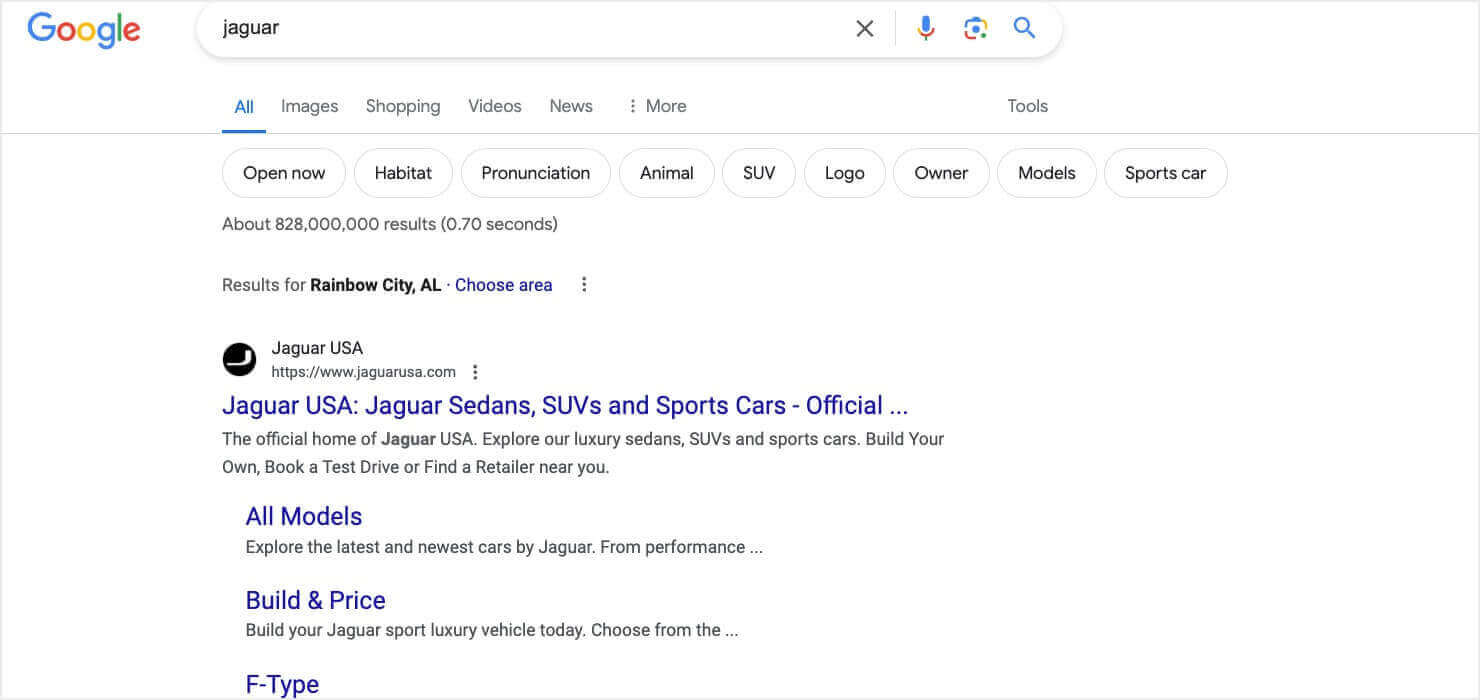

The first result’s for the Jaguar automotive model, which isn’t what I wish to see. As I scrolled by the outcomes, they had been blended between the automotive and the animal. However let’s see what occurs if I add “-car” to the question.
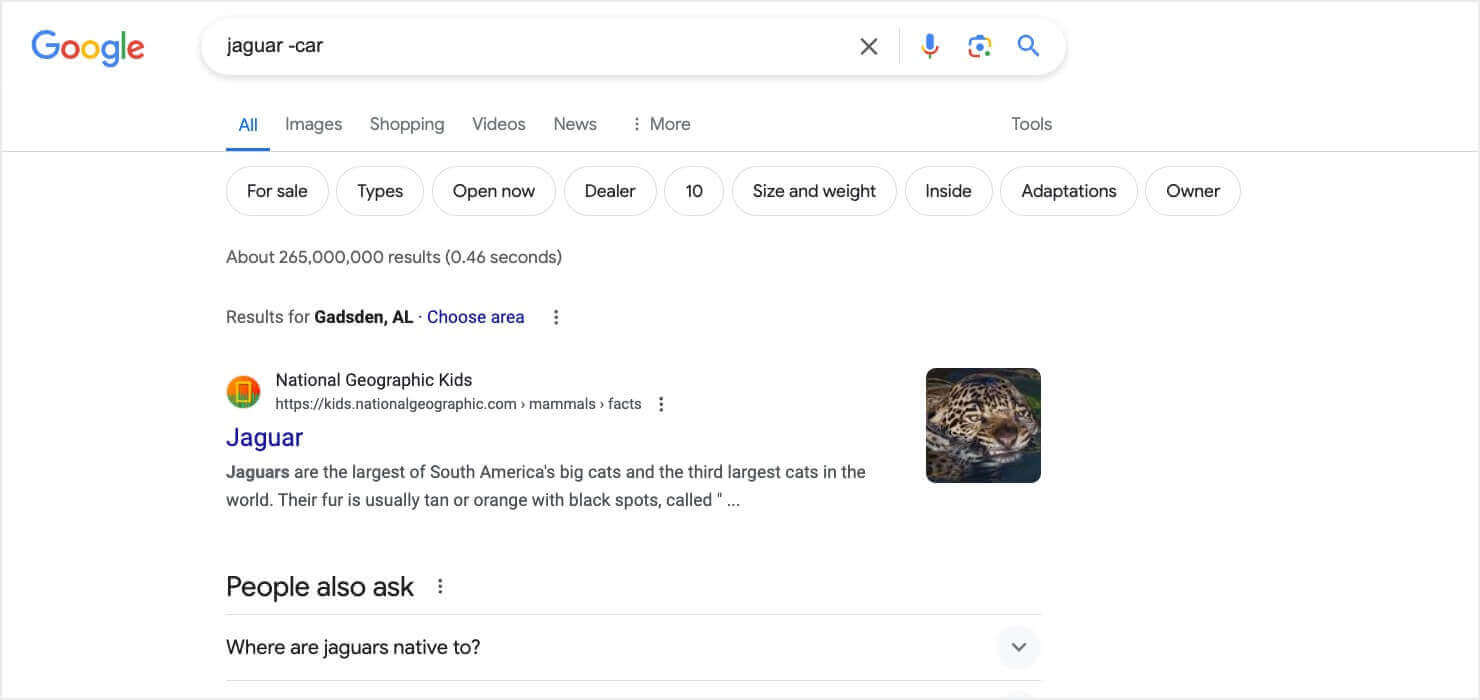

Now, the highest result’s the Nationwide Geographic Youngsters article about jaguars.
Scrolling down, virtually all the outcomes are particularly concerning the animal. The outcomes embody picture search outcomes, recommended questions, and extra articles, all targeted on jaguars. On this occasion, the minus search operator saves me effort and time in getting the precise assets I’m searching for.
3. Website:
Wish to seek for webpages on 1 particular website? Use “website:” in entrance of the URL for the area you wish to search.


That is helpful for researching your rivals or checking your personal web site for any indexing points.
Vital Notice: Don’t embody an area between the colon and the URL. This rule applies to most search instructions that embody a colon.
Use Case: Construct inside hyperlinks
Including inside hyperlinks to your content material helps Google higher perceive your website construction. Plus, it will possibly hold folks in your website longer and scale back bounce charge.
The “bounce charge” article I simply linked is an instance of an inside hyperlink. I discovered it utilizing the “website:” Google search command.
I merely looked for “website:optinmonster.com bounce charge.”
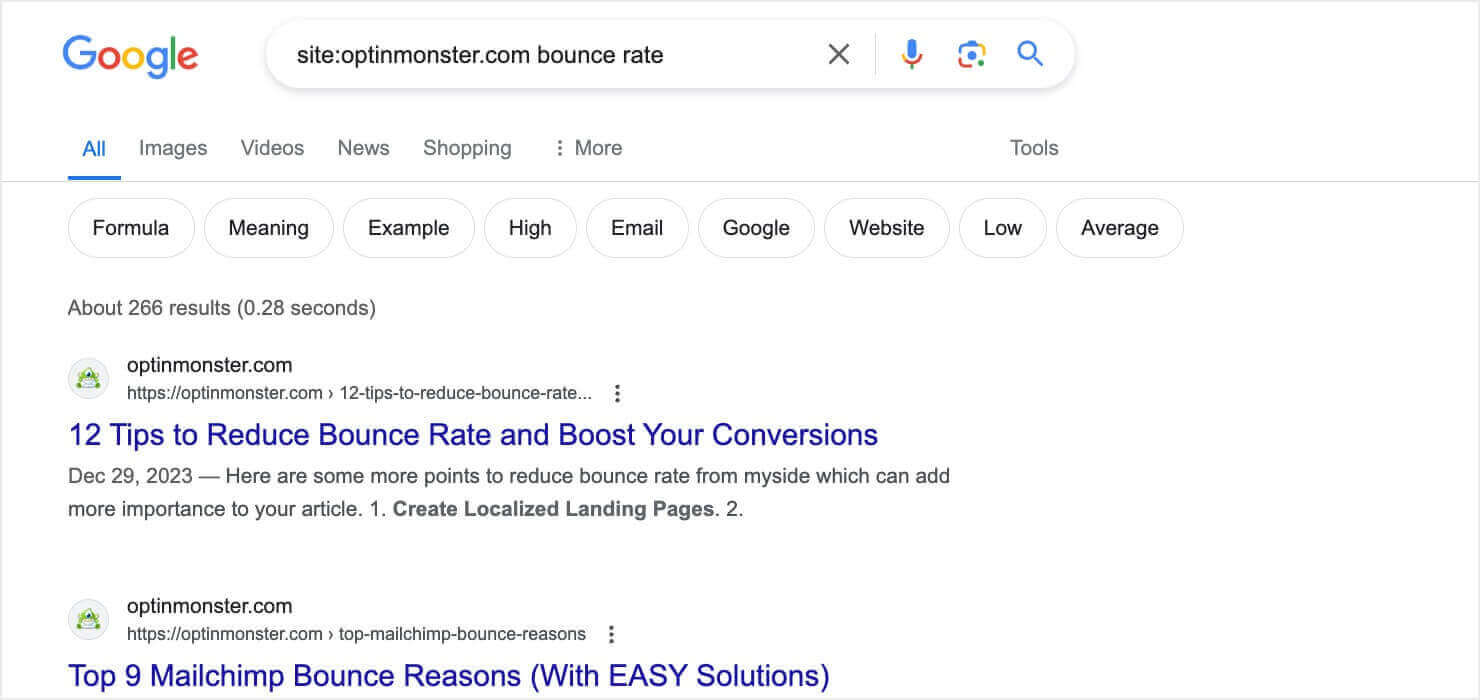

Our website has 266 outcomes that embody the time period “bounce charge,” however Google gave me the article that’s particularly about bounce charges as the highest outcome.
4. Asterisk (*)
Unsure what phrase(s) you want in your search question? Rather than unknown key phrases, add an asterisk (*) and Google will substitute the asterisk with something. The asterisk is called the wildcard operator.


Use Case: Discover listing articles from rivals
That is helpful for locating listing posts by a particular title, when the variety of gadgets within the listing can range. For instance, if I needed to seek out all posts entitled, “High X Free WordPress Themes,” I might do a seek for “High * Free WordPress Themes.”
Listed below are the outcomes for the preliminary search instance I confirmed: “* content material improve concepts”:


The entire outcomes are lists of “content material improve concepts,” with various numbers. One in every of our OptinMonster posts ranks #1, however this search operator lets me simply discover different lists.
5. Inurl:
Wish to see outcomes that embody your key phrase within the URL? Add “inurl:” earlier than your key phrase in your question.


That is helpful when you find yourself searching for particular pages on a website.
Notice: You should utilize allinurl: whenever you wish to specify a number of phrases inside a URL.
Use Case: Discover pointers for visitor posting alternatives
Let’s say I wish to submit a visitor put up for Lifehacker, however their pointers for visitor authors are troublesome to seek out. Many fashionable publishers will really disguise their pointers web page as a result of they’re already swamped with submissions.
I can search the Lifehacker website (utilizing the “website:” search operator) and add the “inurl:” operator to seek for key phrases that may be within the URL, like “pointers,” “contribute,” “submit,” “write for us,” and many others.


Bingo! Now I’ve discovered the web page that explains how I can turn into a Lifehacker contributor.
6. Intitle:
Wish to see solely pages along with your key phrase within the title? Use the “intitle:” search operator simply earlier than the key phrase.


That is helpful for competitor analysis, or researching a weblog the place you wish to get revealed.
Notice: If you wish to seek for titles that comprise a number of particular person phrases, use allintitle: as your operator.
Use Case: Analysis a goal weblog
Persevering with with the earlier use case, let’s say I wish to analysis Lifehacker as a result of I wish to write for them. I do know I wish to write one thing about electronic mail, however I wish to make it possible for I pitch them with a singular angle that they haven’t coated earlier than.
I can search Lifehacker utilizing the “intitle:” operator with the key phrase “electronic mail.” Then, I’d take a look at the headlines that come up.
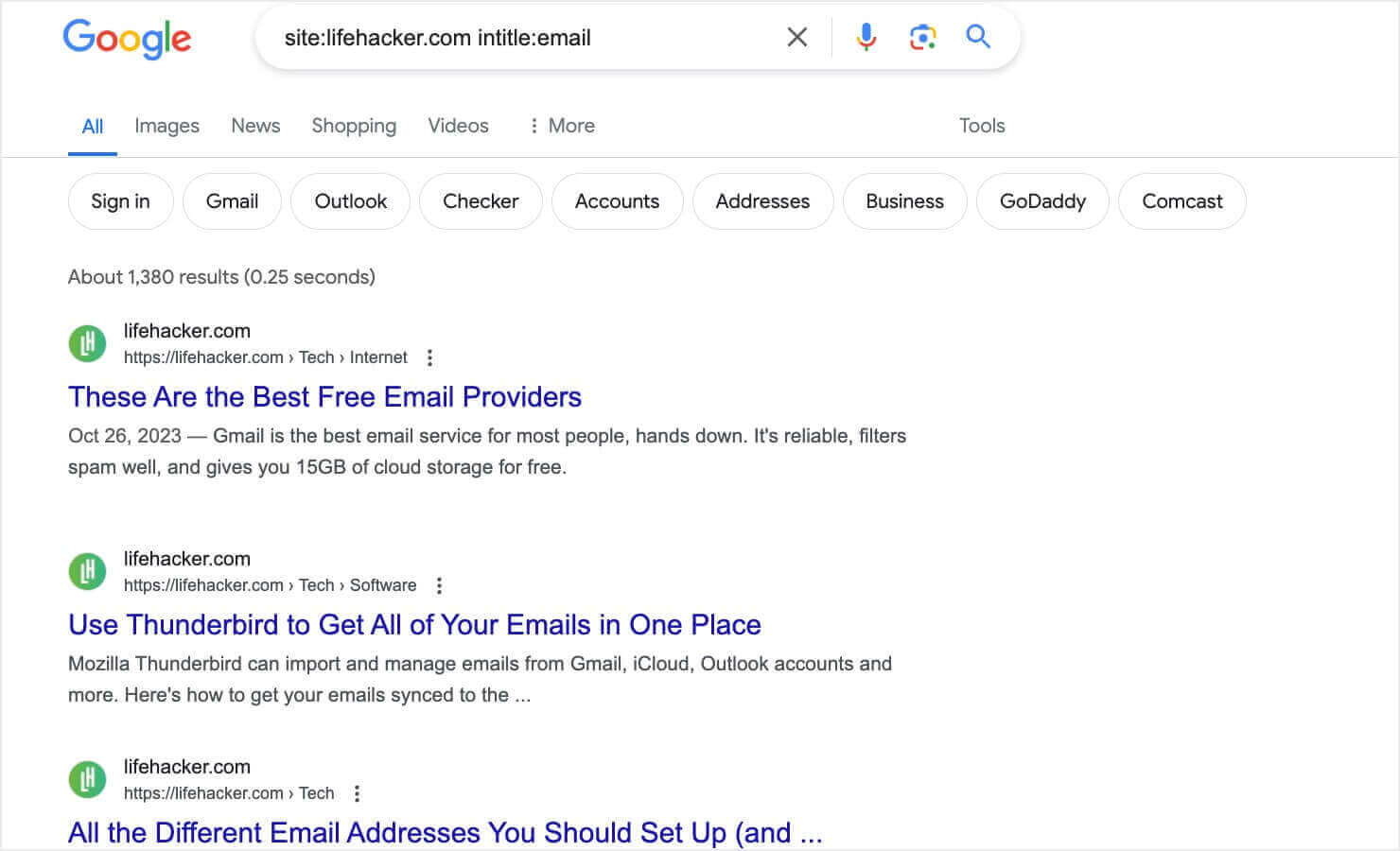

With these search outcomes, I can see an extended listing of headlines about electronic mail that Lifehacker has used previously.
That is actually useful as a result of now I can ship them a pitch alongside the traces of, “I see you’ve revealed a put up concerning the several types of electronic mail addresses folks ought to arrange, however you haven’t but coated…”
Be taught ExtraVisitor Posting 101: Pitch and Safe Your Subsequent Visitor Weblog Submit
7. OR
Wish to see outcomes for one key phrase or one other key phrase? Place “OR” in between every key phrase.


That is helpful whenever you aren’t precisely positive which key phrase gives you the specified outcome.
Notice: You can too use the pipe image (|) instead of OR.
Use Case #1: Make a number of guesses without delay
Bear in mind after I needed to seek out the visitor posting pointers for Lifehacker utilizing the “inurl:” operator? I wasn’t positive precisely which key phrase would reveal the rules web page, however I had a number of educated guesses.
Up to now, I’ve solely been capable of make one guess at a time. Until I make a fortunate guess proper off the bat, this may be time consuming.
To streamline the method, I might use the “OR” operator and make a number of guesses multi functional search question. For instance, “website:lifehacker.com inurl:pointers OR inurl:contribute OR inurl:submit”.
It will return the outcomes for any of those guesses, and hopefully certainly one of these key phrases will hit the mark!
Use Case #2: Uncover model mentions
Wish to discover websites which have talked about your model? It’s a good suggestion to know who’s mentioning and/or linking to your website. You may then construct relationships with these corporations and enhance your link-building technique.
First, you’ll wish to add any totally different names on your model into your search question, together with any doable spellings or misspellings. Use the “OR” operator in between every. For instance, “OptinMonster OR ‘Optin Monster.’”
Then, you’ll use the minus signal to exclude your personal properties from the search outcomes. For instance, I can use “-site:optinmonster.com -site:wpbeginner.com.” You may additionally wish to exclude social media websites, reminiscent of “-site:twitter.com -site:fb.com -linkedin.com -site:youtube.com -site:instagram.com -site:reddit.com”
All put collectively, right here’s what that question appears to be like like:
OptinMonster OR “Optin Monster” -site:OptinMonster.com -site:wpbeginner.com -site:twitter.com -site:fb.com -linkedin.com -site:youtube.com -site:instagram.com -site:reddit.com
Once I first accomplished this search, a number of the outcomes had been documentation pages about find out how to combine different software program with OptinMonster. To filter out these outcomes, I added “-integration” to my search question.
And right here had been the outcomes.
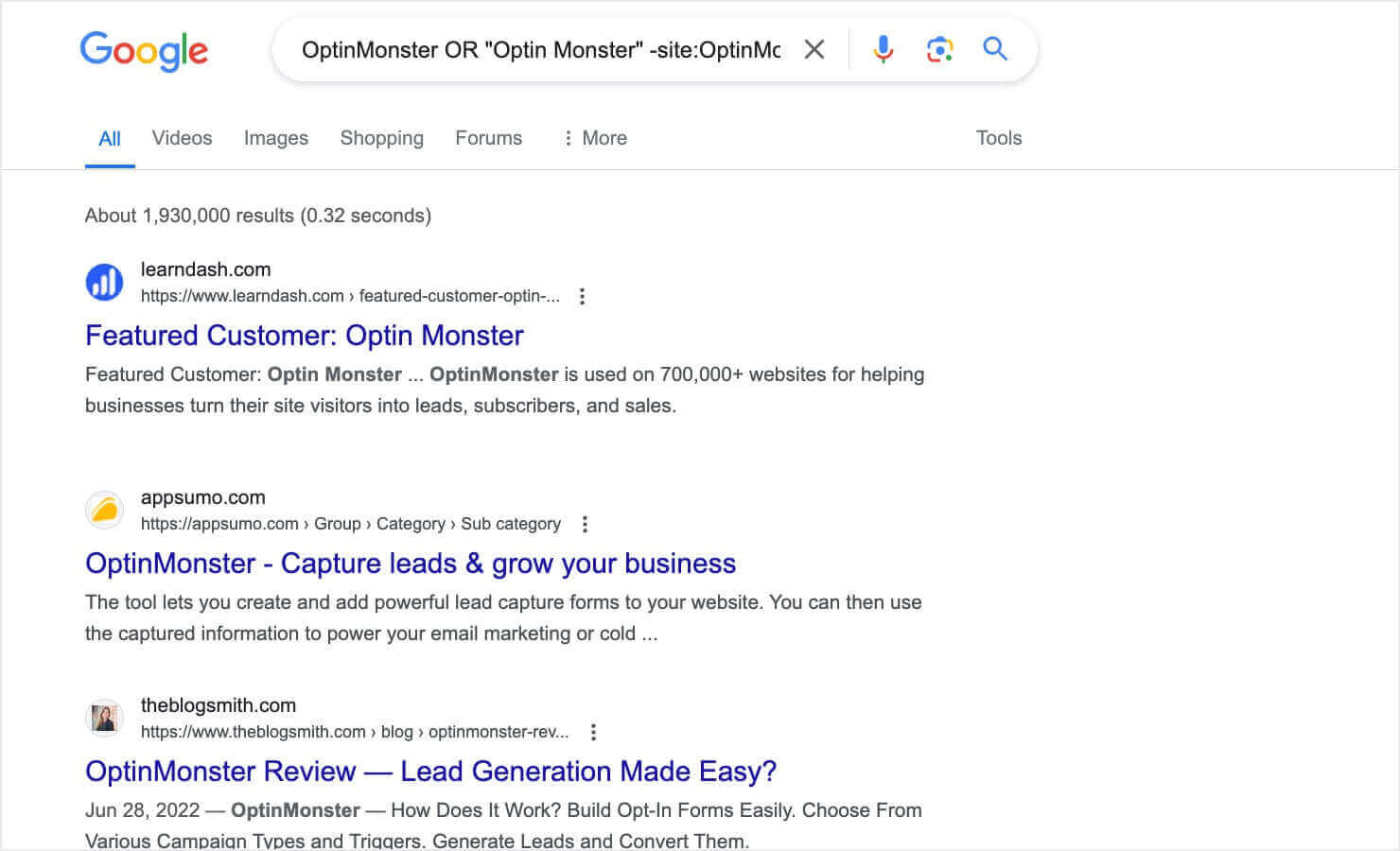

Now, the outcomes give attention to critiques, suggestions, and different content material mentioning OptinMonster.
Now we will create an alert with this search outcome, so we will obtain emails about new model mentions!
To create an alert, first go to google.com/alerts. Then, paste in your search question.


Subsequent, click on on “Present Choices” to customise the settings on your alerts.
Enter your electronic mail and click on the Create Alert button.
That’s it! You’ll now be emailed when a brand new model point out happens so you’ll be able to construct worthwhile relationships and backlinks.
8. Outline:
Wish to discover the definition of a particular time period? Merely use the “outline:” search operator.


Use Case: Subject Analysis & Competitor Analysis
That is helpful for researching a subject for a weblog put up. Or, it’s possible you’ll use it for competitor analysis to see whose web page ranks for the definition you wish to rank for.
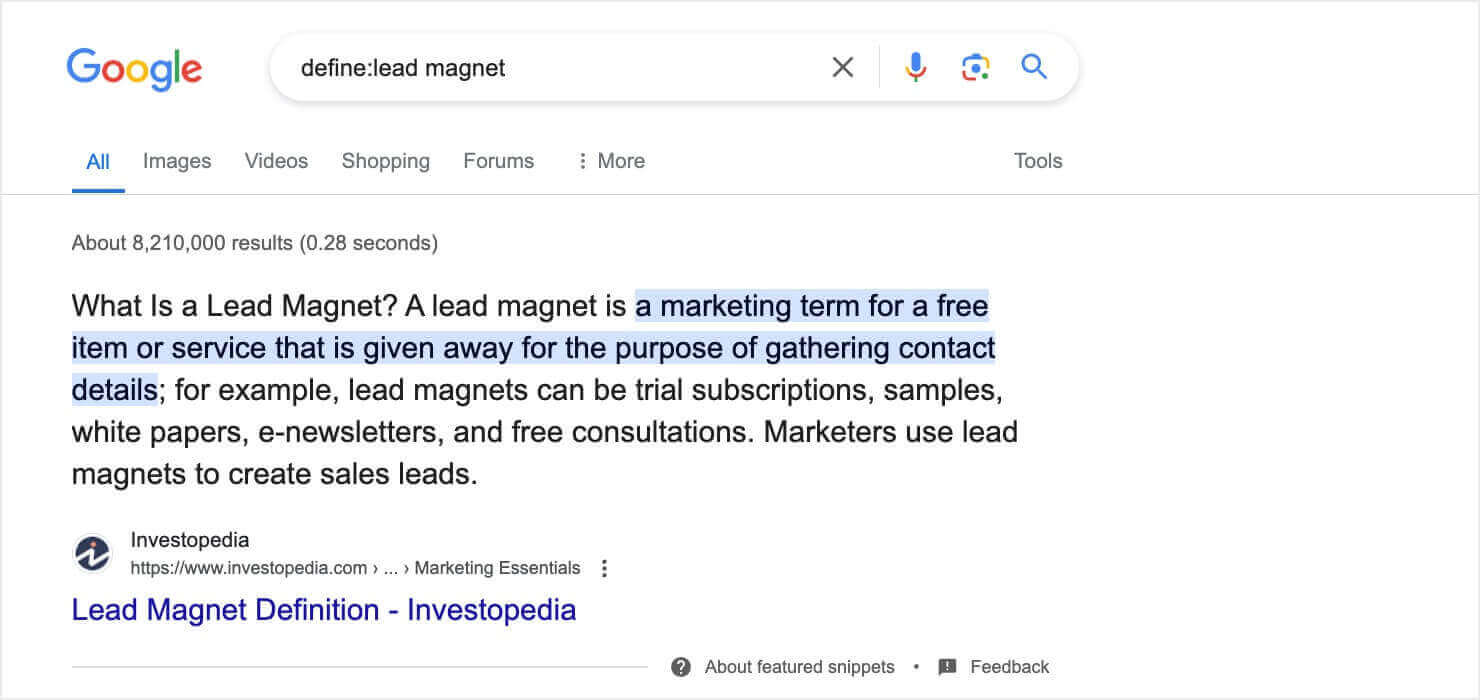

9. Filetype:
Wish to discover a particular filetype along with your key phrase? Use the “filetype:” operator, adopted by the kind of file you’re searching for (e.g. “PDF”).


Notice: You can too use ext: for this identical objective.
Use Case: Discover Statistics from Main Supply Research
If you wish to enhance your web site’s search engine optimisation, it is advisable display E-E-A-T (Experience, Expertise, Authoritativeness, and Trustworthiness) in your content material.
Probably the greatest methods to try this is to supply concrete information to assist your claims and to quote respected sources for that information.
Many companies and analysis companies publish their research as PDFs, so you need to use a “filetype:” search operator that will help you discover research on a particular subject.
I typically write about electronic mail advertising and marketing, so I can seek for “electronic mail advertising and marketing research 2023 filetype:PDF” to seek out PDF studies on latest research.
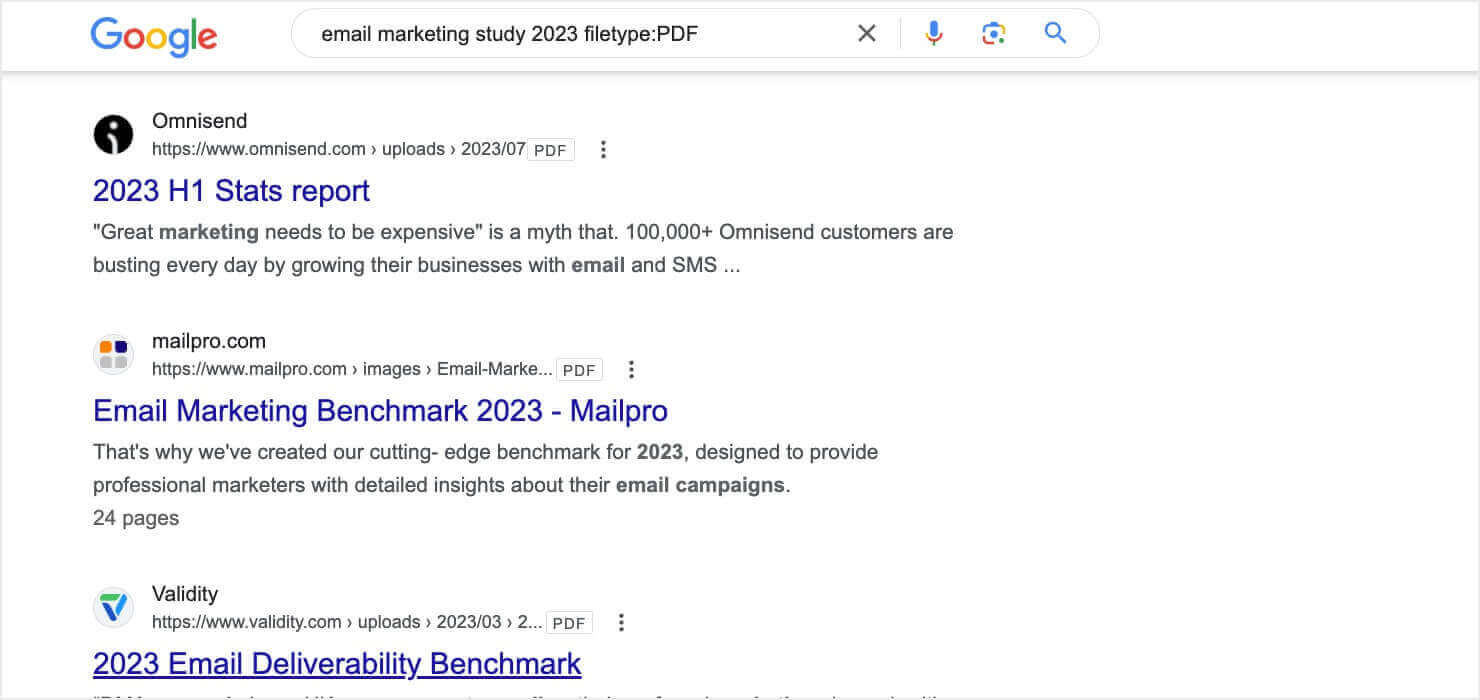

I can use this analysis to create a library of helpful statistics and sources to incorporate in my articles.
Disabled and Unreliable Google Search Instructions
In case you’re a long-time Google person, you might have some search operators you realized about previously that truly now not work.
Listed below are a number of examples of older search operators that Google has dropped:
- inpostauthor: – Gave outcomes written by a particular creator.
- inposttitle: – Particularly looked for weblog title outcomes.
- Plus signal (+) – Allow you to specify that you just needed internet pages that included a number of particular phrases. As an example, “electronic mail + advertising and marketing” or “OptinMonster + popups.” Different operators and search capabilities have taken this command’s place.
- information: – Retrieved Google index info for a particular area.
- Tilde signal (~) – Included outcomes for synonyms of your search time period.
There are additionally some operators that, whereas they haven’t formally been disabled, they’re recognized to be unreliable. I checked these myself, and none of them returned useful outcomes.
- inanchor: and allinanchor: – This operator is meant to seek for hyperlinked anchor textual content. I attempted it out, and Google appeared to easily ignore this command. It simply returned the conventional outcomes for my search time period, as if I hadn’t included “inanchor:” in any respect.
- .. – You’re supposed to have the ability to use 2 durations to point a variety of numbers or costs. I attempted to go looking “laptops $500..$1000,” however I acquired outcomes for all value factors.
- daterange: – You may even see this listed as a search operator to seek out content material inside a date vary. If this ever was an official Google search command, it’s now not purposeful.
Step Up Your Recreation With Google Search Operators
With this helpful Google search operator cheat sheet, you’ve gotten all of the instruments it is advisable enhance your content material advertising and marketing analysis.
Wish to be taught much more about content material advertising and marketing and search engine optimisation? Take a look at these assets:
When you’ve nailed your content material advertising and marketing, it is advisable reap the benefits of the elevated visitors to your website.
OptinMonster is the perfect instrument obtainable to transform your visitors into leads and income.
Our popups, floating bars, and different onsite advertising and marketing campaigns allow you to present your greatest provides to the fitting folks. You’ll additionally get extra high-quality electronic mail subscribers, serving to you win extra gross sales by electronic mail advertising and marketing.
Disclosure: Our content material is reader-supported. This implies when you click on on a few of our hyperlinks, then we might earn a fee. We solely suggest merchandise that we consider will add worth to our readers.


